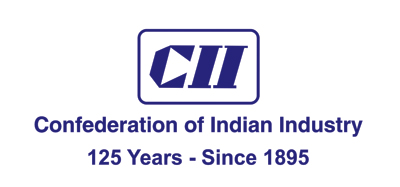Digital Event, 24 July 2021
Co-hosted by the Confederation of Indian Industry (CII), Horasis convened its annual Horasis India Meeting on 24 July. The meeting was held virtually using Horasis digital conferencing platform, gathering 400 of the most senior members of the Horasis Visions Community to discuss how to overcome the COVID-19 crisis and how to inspire India’s future. Download the programme and report.
Piyush Goyal, Minister of Commerce & Industry, Textiles, Consumer Affairs, Food & Public Distribution stated he is confident India will continue its historic highs of inwards foreign investment. He noted exports this year are looking to new records – with one sector, agriculture, moving into the global top 10 of exporters. He emphasized how Prime Minister Modi has been consistently working over the last 10 years to bring about reforms as he is deeply convinced India’s time has come. Minister Goyal notes that the developed economies’ ministers across the world recognize that India is capable and entrepreneurial and is a trusted partner in supply chains. Much of its economy has recovered despite the pandemic; moving to a “self-reliant, self-sufficient, self-confident India”. Chandrajit Banerjee, Director General, Confederation of Indian Industry (CII) concluded that many government paper-chases have now been substituted by fully digitized modes: thus, supporting being a responsive government caring for 1.3 billion people.
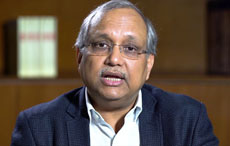 |
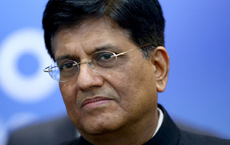 |
| Chandrajit Banerjee |
Minister Piyush Goyal speaking about how to open India again for business |
Preetha Reddy, Vice Chairperson, Apollo Hospitals, India stated we didn’t initially have enough action nodes in our system to fight the pandemics: beds, nurses, testing, etc., but their company has ramped-up by 15,000 beds which is not much for our population – but others have also increased capacity. Unfortunately, in the Indian democracy we have to gently mandate change, so not all people become vaccinated quickly. Women are less vaccinated than men, more so rurally where social norms dictate, they have restricted mobility outside of their homes. Harsh Pati Singhania, Vice Chairman and Managing Director, JK Paper, India observed there was a huge learning curve during the 2nd COVID wave – to manage basics: beds, oxygen and staff and their training: it is now seen India needs a better link between the Central and States governments in these matters. Naresh Trehan, Founder, Medanta, India confirmed these ideas, emphasizing that the virus is unpredictable – it mutates inside a body, then moves on. We must stop bodies being infected by the massive vaccination across the 1.3 billion people: we have a race between mutation and vaccination. Sunil Kant Munjal, Chairman, Hero Corporate Services, India noted India hopes to have vaccinated 950 million by end of 2021 at 7m/day, but is only reaching half that at the moment: it is an ambitious programme. The basic lesson is that India needs to boost its rural health care capacity including training and using technology. All must accept transformative cooperation.
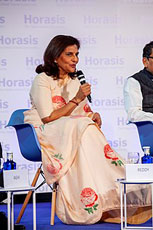 |
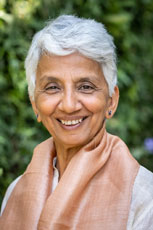 |
| Preetha Reddy, Vice Chairperson, Apollo Hospitals |
Rekha M. Menon, Chairperson and Senior Managing Director, Accenture Solutions India, India |
Looking forward, Naushad Forbes, Co-Chairman, Forbes Marshall, India stressed that much of the Indian economy reacted positively in its initial resilience; indeed, economic recoveries have been rapid. The worst aspect may be the long-term effect on employment rates (negative 17 million at present). Being more competitive is critical for India so as to bring down the cost of doing business and to lift ease of doing business. The instant change in working modes for digitally based firms have reaped benefits. As have start-ups who fully embraced remote working as they can hire new staff from across the world yet work as a close digital group. Rekha M. Menon, Chairperson and Senior Managing Director, Accenture, India accepted COVID has been a defining event but as their work is in ‘the Cloud’ as are many of their associates: the firm grew and lifted our financial guidance. Even so, the remote mode does not satisfy all – many say they need to return to the stimulus of (office) contact. Manufacturing firms have had to reorganize their product lines, and in many cases incorporate greater levels of robotization and AI. R Dinesh, Managing Director, TVS Supply Chain Solutions, India found the pandemic was a heavy learning experience in managing how to get to a paper-less mode in the logistics business. This was helped by people’s appreciation of the vital nature of well managed global supply chains. T V Narendran, President, CII; CEO & Managing Director, Tata Steel Limited, concluded – let us praise where praise is due: the operators were wonderful workers during the pandemic.
Vikram Kirloskar, Vice Chairman, Toyota Kirloskar Motor, India stated the auto sector was in depression before COVID struck – volumes were low, and then COVID closed many factories (both assembly and parts manufacturing). New-tech adoption is difficult as that implies a reduction of labor in many cases, with delayed take up of furloughed labor in associated sectors. Happily, heavy industry expenses fell while local innovation had to rise as roving global experts were unavailable. In the future we have to address carbon neutrality and localization through all sectors/systems. Vineet Mittal, Chairman, Avaada Energy, India also stated Indian cannot be isolated from global supply chains. And it must acquire much more inward investment. Bringing down the cost of doing business and lifting the ease of doing business is critical.
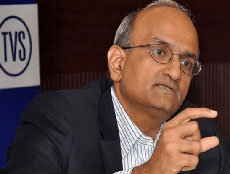 |
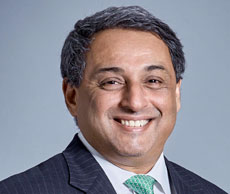 |
| R Dinesh, Managing Director, TVS Supply Chain Solutions Limited |
T V Narendran, President, CII; CEO & Managing Director, Tata Steel Limited, India |
India needs FTAs to create the factories in India to absorb some of its excess labor so create new exports moved via new global supply chains: if it misses out on the first and then all the rest of the benefits are voided. Vijay Eswaran, Chairman, QI Group, Hong Kong suggested India must build on its historic imprint from Africa through to the Philippines, aided perhaps by its ASEAN membership which could extend India’s historic strength through trade, not invasion. By increasing its trade through partnerships India as a whole will increase its need for local labor to produce the goods which would be in greater global demand along its new supply chains. Shivraj Singh Chouhan, Chief Minister, Madhya Pradesh, India illustrated this developmental progress very well. He noted the present-day strength of Madhya Pradesh that arose in one sense accidentally as its location in the heart of India permits easy transit to all parts of the nation. But location is not enough; much work by the State government, guided by the Chief Minister Chouhan has developed the second largest Indian State into a powerhouse, ranking 4th in Ease of Doing Business and having a 97% rating in the Invest in India matrix. And it is environmentally good – being the third largest Indian producer of organic food, having the city of Indore as first cleanest in India for the fourth year. That is one of the great attractors for India’s IT talent that are flocking to the State and thus enhancing its relevance. He illustrated how foresight and hard work is supporting this large State.
Kris Gopalakrishnan, Chairman, Axilor Ventures, India said that based on 30 years of reform, wealth has risen 4.5 times – so he is very optimistic of the future. India should continue with reforms – but perhaps it is too slow as there is a heavy inertia across 1.3 billion people who are naturally quite conservative. Even so, some start-ups have become unicorns instigating cash recycling into the local population, and generally raising wealth through new business models which lack legacy hindrance. Looking 30 years ahead, it is likely India will become a $10 trillion economy, with per capita rising to $10,000 with 750 million middle class: a huge market place. These points were taken up by Hemant Kanoria, Chairman, Srei Infrastructure Finance Limited, India who accepted the COVID variants caused complex deep economic issues, though some sectors have run well: like much of agriculture, technology and some heavy industry. Happily, technology is moving into rural areas boosted by COVID-related needs and the need to deliver more for the highly stressed staffs.
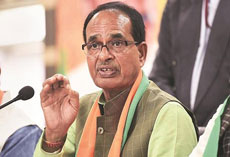 |
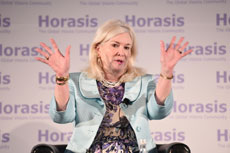 |
| Shivraj Singh Chouhan |
Deborah Wince-Smith, President, United States Council on Competitiveness |
There are new goals to observe – in climate change and in meeting the UN Sustainable Development Goals. Gunjan Sinha, Chairman, MetricStream, USA sees India becoming now a strong global competitor based on a data-driven economy. But most crucially he opined, the world must pay attention to the ESGs – they are a game changer as much as the invention of the Internet was, since all business and systems in firms must embrace ESG. Frank G. Wisner, Under Secretary of State (ret.), USA broadened the conversation somewhat. He noted that COVID has taught that India is a large international donor for disease control, yet India is relatively weak internationally, with weak supply chains: it must attract FDI to create strong value-added exports. And it must address its (military) insecurities, being surrounded by high-risk nuclear-capable nations. It must reduce its trade barriers to gain strengths, and must turn to statecraft not politics. India is proclaiming new developments. India’s growing population and fast-paced development have resulted in a massive infrastructure push via the National Infrastructure Pipeline (NIP) for FY 2019-25. Deborah Wince-Smith, President, United States Council on Competitiveness, USA recognized that overcoming regulations is challenging. India needs more experts in government who understand the future power of up-to-date systems. She suggested they should not concentrate on legislating legacy systems, look instead to the future.
The co-chairs were:
 |
Ashishkumar Chauhan, Managing Director and Chief Executive Officer, BSE, India |
 |
Tejpreet S. Chopra, President & Chief Executive Officer, BLP Group, India |
 |
R Dinesh, Managing Director, TVS Supply Chain Solutions Limited, India |
 |
Suchitra Ella, Joint Managing Director, Bharat Biotech, India |
 |
Naushad Forbes, Co-Chairman, Forbes Marshall, India |
 |
Kris Gopalakrishnan, Chairman, Axilor Ventures, India |
 |
Prakash Hinduja, Chairman Europe, Hinduja Group, Switzerland |
 |
Hemant Kanoria, Chairman, Srei Infrastructure Finance Limited, India |
 |
Rajive Kaul, Past President AIMA; Chairman, Nicco Group, India |
 |
Murtaza Khorakiwala, Managing Director, Wockhardt, India |
 |
Vikram Kirloskar, Vice Chairman, Toyota Kirloskar Motor, India |
 |
Sunil Mehta, Chairman, YES Bank, India |
 |
Vineet Mittal, Chairman, Avaada Energy, India |
 |
R Mukundan, Managing Director, Tata Chemicals, India |
 |
Nasser Munjee, Chairman, Development Credit Bank, India |
 |
T V Narendran, President, CII; CEO & Managing Director, Tata Steel Limited, India |
 |
Anish Shah, Managing Director & Chief Executive Officer, Mahindra & Mahindra, India |
 |
Harsh Pati Singhania, Vice Chairman and Managing Director, JK Paper, India |
 |
Preetha Reddy, Vice Chairperson, Apollo Hospitals, India |
 |
Murat Seitnepesov, Chairman, Caspian Week, Switzerland |
 |
Gunjan Sinha, Chairman, MetricStream, USA |
 |
Deborah Wince-Smith, President, United States Council on Competitiveness, USA |
 |
Frank G. Wisner, Under Secretary of State (ret.), USA |
Introduced 13 years ago, the Horasis India Meeting has become the foremost annual gathering of Indian business leaders and their global counterparts. With this meeting, Horasis offers business and government to discuss a wide range of issues related to the Indian economy. The location of the meeting rotates annually, and has been held in Munich (2009), Madrid (2010), Naples (2011), Antwerp (2012), Belfast (2013), Liverpool (2014), Interlaken (2015), Cascais (2016), Interlaken (2017), Malaga (2018) and Segovia (2019), and virtually in 2020.
Horasis – a global visions community committed to inspiring our future – provides a unique platform for companies from emerging and developed markets to globalize their organisations. In addition to the Horasis India Meeting, Horasis hosts the annual Horasis Global Meeting, Horasis China Meeting, Horasis Asia Meeting, as well as the annual gatherings of the Horasis Visionary Circle.
Co-host:









